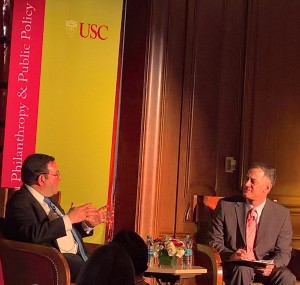 He prefers Corporate Responsibility and Corporate Philanthropy instead of Corporate “Social” Responsibility. He views it as beyond social. It’s good for business, and shareholders, as well. Aligning corporate responsibility with interests of shareholders is a good thing to do. The results are very beneficial for the community at large. Peter Scher, Head of Corporate Responsibility JPMorgan Chase, discussed this with Elwood Hopkins, Founder and Managing Director, Emerging Markets, Inc. at the USC Center on Philanthropy and Public Policy convening.
He prefers Corporate Responsibility and Corporate Philanthropy instead of Corporate “Social” Responsibility. He views it as beyond social. It’s good for business, and shareholders, as well. Aligning corporate responsibility with interests of shareholders is a good thing to do. The results are very beneficial for the community at large. Peter Scher, Head of Corporate Responsibility JPMorgan Chase, discussed this with Elwood Hopkins, Founder and Managing Director, Emerging Markets, Inc. at the USC Center on Philanthropy and Public Policy convening.
Bringing work to the local level is crucial. Youth unemployment in the U.S. Europe and China is high. Kids are not getting training for the jobs being created. We have done skills gap studies. If we can’t get our education system, our schools and neighborhoods fixed, we will be in a lot of trouble in the near future. Helping people develop the skills they need to compete for today’s jobs can transform lives and strengthen economies. Through New Skills at Work, our five-year $250 million global initiative, we are leveraging our resources, expertise, and global reach to help inform and accelerate efforts to support demand-driven skills training for adults. Additionally, we launched a program to expand skills-based education for young people—New Skills For Youth is a $75 million program to help solve the youth unemployment crisis.
Chase has made a significant mark in cities. It’s getting harder to get things done. Most people are living in cities. This is where the challenges are. This is where we think we can make the biggest difference. When making decisions on resource allocation, issues across the world with cities are similar. I can have the same conversation around the world with mayors. What is going right? How can we replicate?
Got call that Jamie (Dimon) wants to see him. 12 second meeting. “I want you to go to Detroit and see what we can do.” So I put together a team and looked at Detroit for 6 months. We met with politicians, business and civic leaders. Everyone was on the same page. They were preparing to come out of bankruptcy. If we held the same meeting prior to bankruptcy, we would not have had consensus. Blight, infrastructure, housing, employment, education. How do you develop a strategy that you can apply to see results? A plan was crafted for a significant investment. If you give organizations money, do they have the capacity to absorb it? What kind of expertise do they need. Grants were made so as they could hire the right people. Every quarter took a group of employees, our service corps, went to Detroit, and help organizations that can make change. I personally met with these groups before and after their assignment.
Data… The magnitude of data. We really have seen this in the last 18 months. We engaged urban institute to evaluate programs in progress as we don’t want to wait a few years to learn if successful or not. A lot of what we do doesn’t work and we want to know why, so we can change. As for how we could use our data, we hired the wackiest liberal privacy experts to test our thinking and were cleared to apply it to community and philanthropic purposes. Taking information such as where our customers are spending money, and on what, tells us a lot than can help us better address needs in underserved communities.
https://www.jpmorganchase.com/corporate/Corporate-Responsibility/new-skills-at-work
https://www.jpmorganchase.com/corporate/Corporate-Responsibility/detroit.htm
